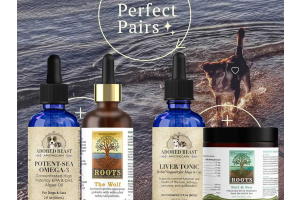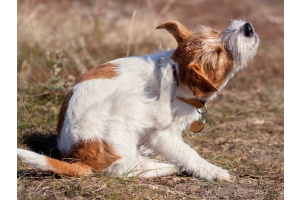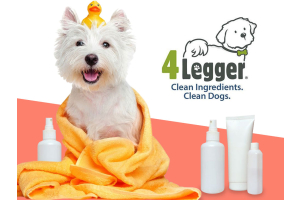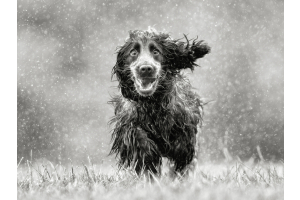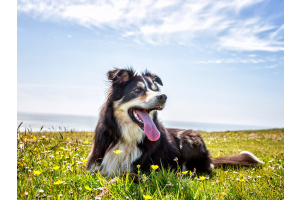4-Legger
- - April 08, 2025
I would like to purchase a natural dog shampoo such as 4-legger but I would like to understand how they are fragranced and do they contain any artificial colours?
4-Legger Shampoos are high quality, organic dog shampoos from the US. These dog shampoos are free from artificial colours, fragrances and any toxic additives.
When it comes to fragrance the 4-Legger shampoos rely on essential oils, such as lavender or lemongrass for their scent, rather than artificial chemicals. But, those essential oils are added for their known health benefits for your pet. The fact the shampoos smell great is a bonus!
When it comes to natural ingredients any scent is therefore natural. and it will not last as long as synthetic fragrances or products that use synthetic ingredients to unnaturally extend the length of time the scent may last.
In terms of the colour of 4-Legger shampoos - the organic ingredients take on their natural color. They have an amber colour but none are exactly the same. Their
- - January 06, 2025
You want to reduce your dog's exposure to "toxic goo" dog shampoo but you want to know what to expect when switching to a true organic dog shampoo. 4-Legger has helped thousands of pet parents through this transition so we can help set your expectations and offer a few tips!
Quality in - Quality Out
It is important to keep in mind that the health of your dog's skin and coat is affected by the food and treats you feed them. If you are feeding your dog high quality food, the transition will be less noticeable than if you are feeding lower quality food.
Concentrated but thinner consistency
Traditional synthetic thickeners in pet grooming products can't be used in certified organic dog shampoo as they are on the restricted list. These synthetic thickeners can have links to allergies, dry and itchy skin, hormone disruption and organ toxicity, and despite claims otherwise; they are not natural.
As a result, most organic dog shampoo is fairly thin but concentrated (meaning a little goes
- - May 23, 2024
As the happy pet parent of a new puppy, you may be pondering over a seemingly simple question: Is there a real difference between puppy shampoo and adult dog shampoo? The answer may surprise you and hopefully it will make you question some of the products marketed as puppy shampoo. By the end of this article you will be able to recognise what to look for in a natural dog shampoo that is safe for puppies.
WHAT MAKES PUPPY SHAMPOO DIFFERENT FROM ADULT DOG SHAMPOO?
The general idea behind puppy shampoo is that it would use more mild ingredients than shampoo made for adult dogs because a puppy's skin is more delicate, thin, and sensitive compared to an adult dog's skin (the same is true of humans too)! A puppy's skin is also less resistant to chemicals and harsh ingredients so it should never contain artificial fragrance, artificial colors, or harsh preservatives.
WHAT SHOULD YOU LOOK FOR IN A PUPPY SHAMPOO?
Finding a puppy shampoo isn't as easy as looking at the bottle, trusting the
- - April 07, 2024
Dogs can experience itchy skin for a variety of reasons, ranging from environmental factors to health-related issues. Some of the common causes include:
1. Allergies: Dogs can be allergic to a variety of substances, including pollen, dust mites, mold, and have sensitivities to certain foods. These allergies can cause skin irritation and itching.
2. Flea Allergy: Flea allergy dermatitis, caused by an allergic reaction to flea bites, is particularly notorious for causing intense itching.
3. Bacteria and Yeast: An imbalance of the bacteria and yeast in the skin microbiome or in the gut can lead to itchy skin in dogs.
4. Dry Skin: Dry skin, which can be due to environmental factors such as low humidity or nutritional deficiencies, can cause itching and flaking.
5. Hormonal Imbalances: Hormone imbalances and conditions like hypothyroidism or Cushing's disease can lead to skin problems, including itchiness.
6. Environmental Irritants: Chemicals in cleaning products, - - April 07, 2024
As a pet parent, you are likely no stranger to dry dog skin. Picture this: Your beloved four-legged companion with constantly irritated skin, incessant scratching, leaving behind flakes in their coat, and perhaps even developing redness or hot spots. The telltale signs of dry dog skin can be as frustrating for your furry friend as they are for you. This is especially true if your dog sleeps with you! Any pet parent who has been awakened by the bed shaking from a scratching dog knows what I am talking about, right?
Understanding Dry Skin in Dogs
Before diving into the benefits of hemp dog shampoo, it's crucial to understand what causes dry skin in dogs. Dogs can have dry and itchy skin for various reasons, including:
- Allergies: Allergic reactions to food, pollen, dust, or other allergens can lead to skin irritation.
- Changes in Weather: Dry air, extreme temperatures, and low humidity can dehydrate the skin (just like it does your skin - you just can't see it because it is covered in your
